February 10, 2025
Class Visit to Food Pantry Sheds Insights
Students in the Eco-Design and Construction class visited the Food For Life Food Pantry in Granby to learn more about the organization and its needs. The class will refurbish a van, generously donated by Hoffman Auto Group, for the organization to use as the volunteers pick up food items from local organizations. Food for Life is more than just a food assistance program—it’s a community effort dedicated to helping those in need. It is one of over 350 food pantries in Connecticut, supported by Food Share and local donors. This pantry provides essential groceries, fresh produce, and more to families facing food insecurity.
The students met with Pastor Al Royal and volunteer Jim Long to learn about the operations. Every Wednesday from 2:00 p.m. to 6:00 p.m., clients arrive and take a number before waiting to shop. While they wait, they can help themselves to a selection of fresh vegetables and fruits that are available, particularly in the summertime, when local farmers donate their excess crops.
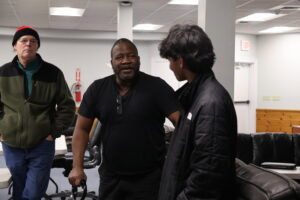
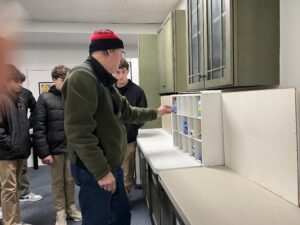
Inside, volunteers work hard to sort and organize the food. Four small shopping carts are available for clients, who can pick out what they need based on availability. Unlike some food banks, clients can visit as often as necessary—there is no limit to how often they can receive assistance.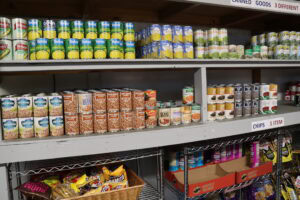
For emergency situations, arrangements can be made outside of regular hours. One single mom with two children had no money, so volunteers often stepped in, and opened the pantry after church to help her.
Much of the pantry’s food is supplied by Food Share, which was initially based in Bloomfield and now operates in Wallingford and Bloomfield and is delivered on Tuesdays. The items are unloaded and sorted by the dedicated staff. Pastor Al Royal explained to the students that Food Share contacted local grocery stores such as Aldi and Shoprite and told them that instead of throwing out the surplus food, they should donate it to their organization. Some foods may be derived from church and business food drives. In many cases, Don, a volunteer, drives to various shops on Friday to collect the food from the stores.
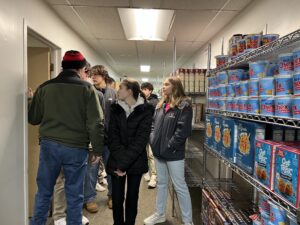
Inside the pantry, shelves are meticulously stocked with various food, including canned goods, dairy products, meat, and bakery items. Staples like bread, eggs, and beans tend to disappear quickly. Some donated goods, such as seasonal treats from Magnolia Bakery, provide a little extra joy to families. There’s plenty of name brands, too, not just generic items.
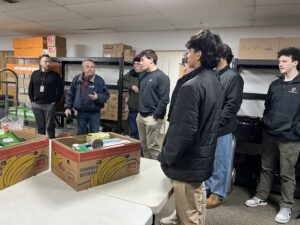
There are also non-food essentials, including toiletries, diapers, and hygiene products—items that cannot be purchased with food stamps. Volunteers carefully regulate these supplies to ensure fair distribution.
The pantry serves a diverse group of individuals, including elderly residents on fixed incomes, single mothers struggling to make ends meet, and families facing temporary financial hardships, such as job loss. Long explained one man driving a Lexus, who recently lost his job, drove in, embarrassed to be at the food pantry. Long consoled him and told him that many professionals who never expected to be in this situation and who have recently fallen on hard times are often there.
The goal is to provide food with dignity and respect, reinforcing the idea that anyone can find themselves in need at some point. The pantry encourages clients to return the favor when they’re able, either through donations or volunteering.
With the pantry’s generosity, there have been cases of people trying to take more than their fair share. One individual delighted that there was frozen salmon in stock, took six pieces. Volunteers ensured fair distribution, limiting the high-demand items to only two per person.
Additionally, some federal food donations (TFAP items) require eligibility paperwork, meaning that not all clients can take everything. These restrictions ensure that government-subsidized food reaches those who meet income qualifications.
The Food For Life Food Pantry operates thanks to dedicated volunteers, many of whom are members of the local church community. The board includes a mix of leaders, including a retired airline pilot and long-time pantry organizers. They meet quarterly to plan and oversee operations.
The students gained great insights from this non-profit so they could better design the van to suit its specific needs.
